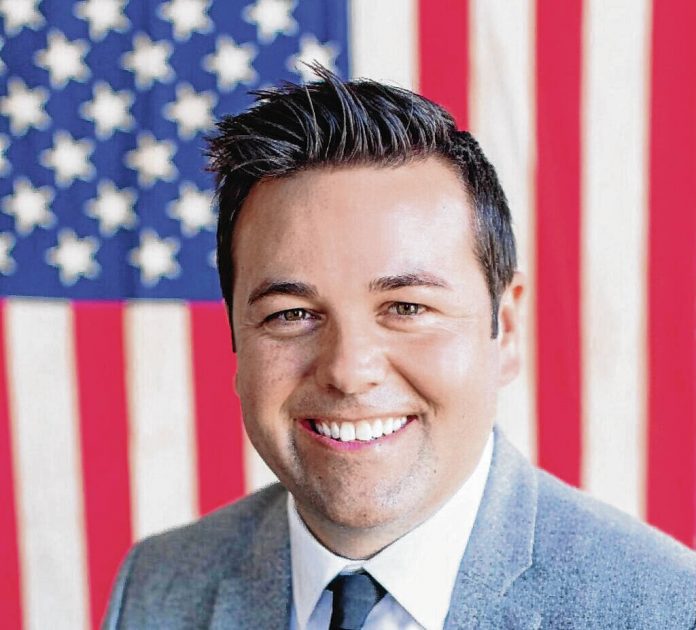Conservative pastor and influencer Micah Beckwith on Monday announced a bid for Indiana’s second-highest post of lieutenant governor — unprecedented in a state where partisan delegates, not voters at large, choose the nominee.
“During these turbulent times, the people of Indiana deserve a Lt. Governor who is more than a ceremonial appointment or yes person,” Beckwith said in a news release. “They need a proactive Lt. Governor who will fight for our constitutional rights, lead the war against the woke culture and get the politics out of the classroom.”
Beckwith is a pastor at Life Church’s Noblesville campus and co-hosts a podcast called “Jesus, Sex and Politics” with another pastor — alongside other activities — according to the release. He previously ran for the Fifth Congressional District in 2020 but lost the primary election to sitting Rep. Victoria Spartz.
Nearly 2,000 Republican Party delegates vote on a candidate for lieutenant governor at an insular annual nominating convention. That nominee faces a delegate-nominated Democrat at the general election — although the GOP has dominated statewide races in recent years.
An unusual maneuver
Hopefuls usually campaign to some degree — but more privately, said Andrew Downs, an emeritus associate professor of political science at Purdue University Fort Wayne and a longtime political analyst.
“Those individuals have spoken with party insiders, and they’ve done things to try and appeal to gubernatorial candidates. That’s always been going on,” Downs said. “The difference here is how publicly it’s happening.”
“I think part of the reason it’s happening so publicly is because it’s just so gosh darn easy to do now,” Downs added, citing technological advances that have made key campaign elements like websites easy and inexpensive to set up.
Nominating conventions often take heat for their insulation from the general electorate. After the behind-the-scenes maneuvering, victors are often — but not always — foregone conclusions.
“The Democrats and Republicans in Indiana have really set up some pretty high walls to keep the non-establishment anointees from running, and I don’t like that,” Beckwith told the Capital Chronicle. “I want it to be an easier process.”
Beckwith said he’d been considering a public bid since the state’s pandemic-era shutdown. He said he thought Gov. Eric Holcomb “overstepped his constitutional authority” at that time, and disagreed with vetoes on a transgender girls sports ban and a permitless handgun carry bill.
“It hit me: why does the governor get to anoint their pick for lieutenant governor, and why do the delegates just go along with that?” Beckwith asked. “And I thought if the delegates would have had their voices represented and picked who they thought was best in the executive branch for the last four years, maybe Gov. Holcomb wouldn’t have done what he’s done.”
Campaigning to 2,000 people, for now
Despite the public start to his bid, Beckwith said his campaign would be “laser-focused” on delegates, with mailers, phone calls and coffee invitations.
Based on other statewide races in which delegates choose nominees — auditor, treasurer, secretary of state and attorney general — Beckwith said his campaign was aiming to raise between $200,000 and $500,000.
But who’s officially a delegate in an election cycle isn’t clear until after the primary election, Downs said. Candidates can get close, however: delegates often reprise their roles, and current or former local party officials are typically influential among them.
Beckwith said he’d spoken with the current slate of Republican gubernatorial candidates: socially conservative U.S. Sen. Mike Braun, Lt. Gov. Suzanne Crouch, Fort Wayne businessman Eric Doden and the devout Jamie Reitenour.
Asked who he’d support, Beckwith said he could work with any, “championing” strengths and filling in weaknesses.
Beckwith also acknowledged rumors that he’d like former Indiana Attorney General Curtis Hill as his gubernatorial running-mate, saying, “I’m going to the convention. I like Curtis but I don’t know with 100% certainty if he’s actually going to get in the race.”
But if Beckwith amasses enough delegate support, there’s the potential for him to act as a kingmaker, according to Downs.
“If he has enough people who are saying they will back him at the state convention, and they begin to say, ‘Well, wait a minute, which one of these candidates do you want as the governor?’ Now he’s in a very different position than if he had quietly been doing things,” Downs said.
By Leslie Bonilla Muñiz. The Indiana Capital Chronicle is an independent, not-for-profit news organization that covers state government, policy and elections.





